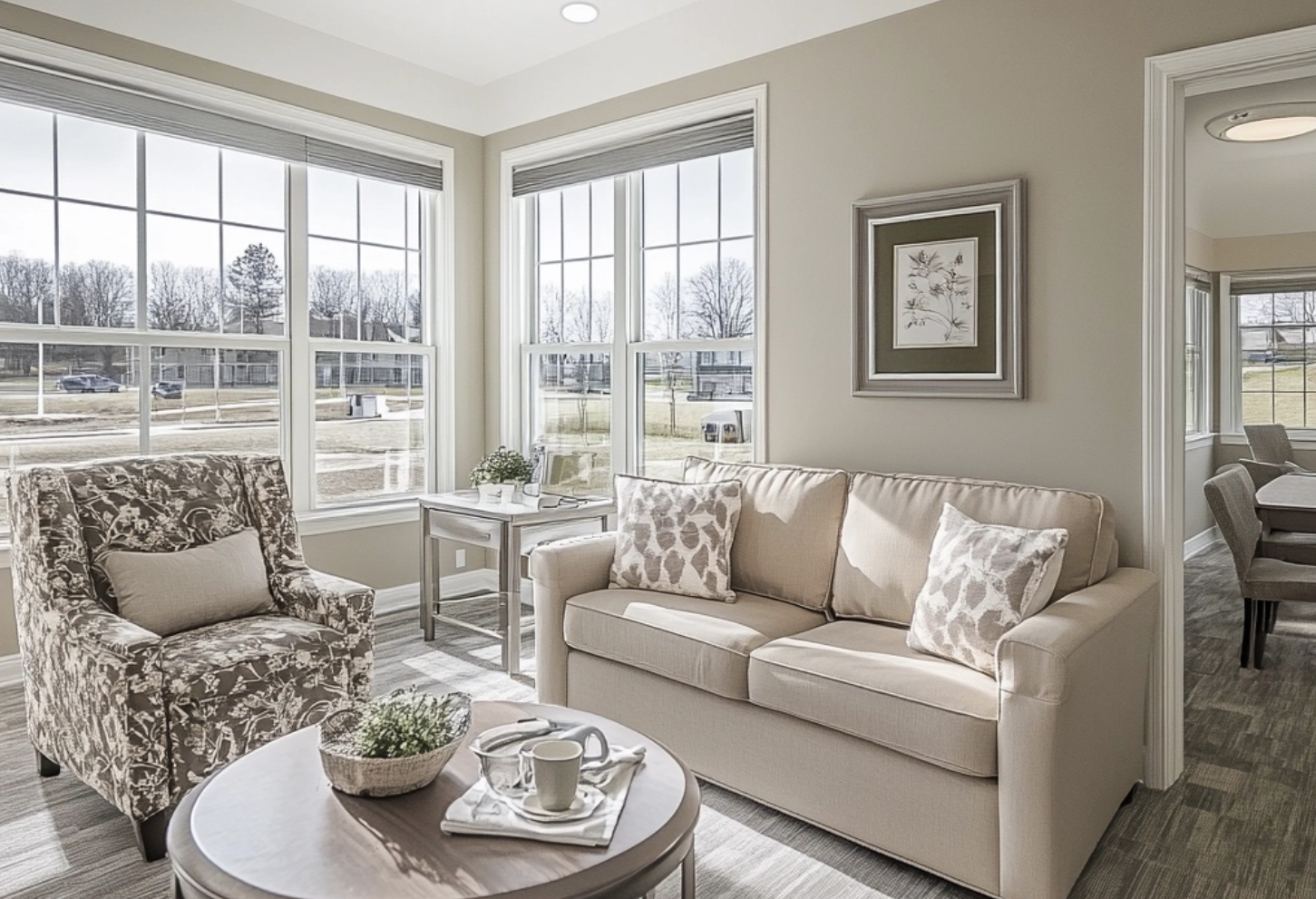The search for Jewish assisted living homes presents significant challenges for the 7.6 million Americans who identify as Jewish—about 2.4 percent of the U.S. population. These communities provide specialized services beyond standard senior care facilities, meeting unique cultural and religious needs.
Jewish senior living facilities have evolved substantially since 1953, when institutions like the Dallas Home for Jewish Aged first opened. Modern Jewish assisted living facilities welcome residents of all faiths while offering kosher dining options, on-site religious studies programs, and transportation to local synagogues. The average monthly cost of $5,350 matches standard assisted living rates, though prices fluctuate based on location and amenities. Many operate as nonprofit organizations, directing profits back into resident care and facility improvements.
This guide examines resident experiences, selection criteria for appropriate communities, and distinctive features of Jewish assisted living. Families researching kosher assisted living options or evaluating facilities for loved ones will find practical information for making informed decisions about this important life transition.
What Makes Jewish Assisted Living Unique
Jewish assisted living communities combine quality care with traditional Jewish customs and practices. These facilities offer distinctive features beyond standard senior care services, creating environments where residents maintain cultural connections while receiving necessary support.
Kosher dining and dietary observance
Kosher dining stands as a fundamental element in Jewish senior living communities. Approximately 17% of American Jews maintain kosher homes, making this option vital for many families seeking assisted living. The level of dietary observance varies across facilities:
- Some communities operate fully certified kitchens with Vaad-approved supervisors
- Many facilities maintain separate meat and dairy kitchens with distinct dishwashing areas and cookware
- Jewish-lifestyle dining provides flexibility while respecting traditions
Gurwin exemplifies stringent observance, with glatt kosher dining supervised by full-time Mashgichim to ensure proper Kashrus standards. Even facilities without strict certification typically avoid serving non-kosher foods like pork and shellfish.
On-site Shabbat and holiday services
Shabbat celebrations remain central to Jewish assisted living. Most facilities host weekly Shabbat services on Friday evenings and Saturday mornings, often followed by special Oneg dinners that foster community connections. These facilities recognize Jewish holidays as essential to maintaining cultural identity.
Beyond religious observance, holiday celebrations create meaningful shared experiences. Communities organize Passover seders, Hanukkah lighting ceremonies, and other traditional events that provide structure throughout the year. One resident described a nursing home Shabbat service: “This is what makes Shabbat different from all other days—we think about different things, set aside special things to do”.
Torah study and spiritual support
Jewish tradition values lifelong learning, reflected in educational programming at assisted living facilities:
Daily Torah classes for various knowledge levels Discussion groups focusing on Jewish topics Libraries with Torah texts and Jewish literature Guest lecturers discussing Jewish history and culture
Spiritual guidance represents another key component of these communities. Many facilities employ rabbis or chaplains who provide one-on-one counseling, helping residents address life challenges through faith-based perspectives. Some communities feature dedicated spaces for Torah study (beit midrash), supporting both individual and group learning opportunities.
Cultural programming and community values
Core Jewish values of respect, kindness, and charity shape community life in these facilities. These principles influence staff training, resident interactions, and daily activities.
Cultural programming celebrates Jewish heritage through music, art, and food. Residents participate in traditional bread-baking classes or attend lectures about Jewish history, activities that combine education with social engagement.
Most Jewish assisted living communities welcome residents of all faiths. Hebrew SeniorLife reports that while 85-90% of their residents identify as Jewish, non-Jewish residents receive equal treatment and respect. This inclusive approach reflects traditional Jewish values of hospitality.
Jewish senior living facilities create environments where residents maintain religious and cultural connections while receiving professional care. Their distinctive features—from kosher kitchens to holiday celebrations—honor heritage while addressing contemporary senior care needs.
Types of Jewish Senior Living Options
Jewish senior living communities offer various care options tailored to different needs and preferences. These facilities provide culturally sensitive environments ranging from independent retirement settings to comprehensive medical care.
Independent living
Independent living communities cater to active Jewish seniors seeking autonomy while maintaining connections to Jewish culture. These settings focus on lifestyle enhancement rather than healthcare delivery. Designed to promote independence, connection, and convenience, these communities allow residents to maintain their routines without home maintenance responsibilities.
Amenities typically include:
- Private apartments or bungalows with kitchenettes
- Community centers and social gathering spaces
- Weekly housekeeping and laundry services
- Transportation to local synagogues and Jewish cultural events
- Recreational activities reflecting Jewish interests
Independent living works best for seniors who remain active without needing regular personal care assistance. Most facilities feature communal dining areas serving kosher or kosher-style meals, creating natural socialization opportunities among residents with shared cultural backgrounds.
Assisted living
Jewish assisted living provides a middle ground for seniors requiring daily support while maintaining independence. These communities offer personalized assistance with daily activities, medication management, and social programming, with staff available 24 hours daily.
The average cost runs approximately $5,350 monthly, comparable to standard assisted living, with variations based on location, amenities, care level, and room type. Beyond basic care, Jewish assisted living communities emphasize spiritual elements, with some employing full-time rabbis who provide guidance to families, residents, and staff.
These communities welcome all faiths while centering Jewish values including respect, kindness, and charity. Most function as nonprofit organizations managed by boards and volunteers, directing all profits back into resident care.
Memory care
Jewish memory care facilities provide specialized support for residents with Alzheimer’s, dementia, and related conditions. These environments deliver compassionate, specialized round-the-clock care in secure, family-like settings.
Several communities implement innovative approaches like the “I’m Still Here®” methodology—a non-pharmacologic program based on Montessori-inspired learning techniques. This evidence-based approach emphasizes meaningful engagement to reduce symptoms associated with memory disorders.
Jewish memory care typically includes:
- Interest clubs centered on Jewish cultural interests
- Purpose-driven activities utilizing residents’ existing skills
- Learning stations and parallel programming
- Secure outdoor spaces designed for cognitive support
The Lodge at Wolk Manor Memory Care creates small-scale, home-like environments with private rooms that promote feelings of warmth and familiarity, reflecting Jewish values of supportive community.
Skilled nursing and rehabilitation
Jewish skilled nursing facilities provide comprehensive care grounded in traditional values for seniors needing continuous medical supervision. Many have delivered exceptional nursing services for generations—some exceeding 100 years—with skill, compassion, and respect.
These centers typically offer both long-term care and short-term rehabilitation following hospital stays. Services often include Harvard Medical School-affiliated geriatric specialists, personalized care plans, kosher nutrition services, and spiritual support.
The Jewish Home and Rehabilitation Center provides healthcare and rehabilitation services aimed at restoring independence and promoting wellbeing. Whether for rehabilitation or permanent residence, these facilities deliver personalized care within environments respectful of Jewish faith and practices.
Real Stories from Residents and Families
Residents and family members consistently highlight the unique combination of cultural connection and quality care that draws many families to Jewish assisted living communities.
Choosing a community that felt like home
The right assisted living decision often hinges on finding a place that genuinely feels like home. Jewish assisted living residents frequently describe their communities as places where they immediately experience belonging and connection.
“I love my home, I love my apartment, and I love the surrounding area. Every time I go downstairs, there’s always someone to talk to,” explained one resident. This social environment proves particularly valuable for seniors transitioning from independent living situations.
A resident whose husband previously worked as a professor shared their experience finding new purpose: “My husband joined the writing groups, and I got involved in all the lifelong learning programs. It’s amazing—there’s so much to do and so many ways to stay connected.”
How faith-based care improved quality of life
Faith-based environments create measurable improvements in residents’ overall wellbeing. One resident experienced significant health and outlook improvements after moving to a Jewish senior living community, adopting a more active lifestyle within the supportive environment.
Family members often notice changes extending beyond physical health. “The personalized care and attention provided by the staff not only improved my loved one’s physical health but also lifted their spirits and outlook on life,” observed one family member.
This approach benefits residents across faith backgrounds. Sister Karen from another faith-based community notes: “Some people here aren’t religious, some aren’t Catholic, some aren’t anything. To have an idea or a connection to something they believe in offers hope and support, and adds to wellness of mind, body and spirit.”
A caregiver’s perspective on Jewish senior living
Caregivers regularly express relief after finding appropriate Jewish assisted living options. “Selfhelp provides such extraordinary attention and personalized care for my mother that I rarely worry about her which is a blessing,” stated one family member.
Communication quality appears consistently in testimonials: “The communication with staff has been terrific. I feel that someone is always available and interested in helping my mom with anything she needs.”
Holiday programming creates meaningful experiences for families. A caregiver commented, “My congratulations to whoever planned the Chanukah event. It was perfection, well thought out and planned, organized… What you do every day is so meaningful for so many people.”
These communities deliver peace of mind through person-centered approaches that “respect and value the uniqueness of the individual” while fostering environments promoting “choice, empathy and compassion, personal worth and empowerment.”
How to Choose the Right Jewish Assisted Living Home
Selecting a Jewish assisted living home requires thorough research and careful evaluation. Understanding what makes a community appropriate extends beyond examining basic amenities to evaluating how Jewish values and traditions integrate into daily operations and resident experiences.
Questions to ask during a tour
Asking targeted questions during facility tours helps determine if a community aligns with specific religious and care needs. Visitors should inquire about Shabbat services, High Holiday celebrations, and availability of Torah study groups. Questions about transportation to off-site worship and access to rabbinical support clarify how facilities accommodate religious observance.
Practical considerations remain equally important—staff credentials, nursing coverage, staff-to-resident ratios, and medical services offered on-site. Families unable to visit facilities in person can often arrange virtual tours through video calls or FaceTime, allowing remote participation in the selection process.
Checklist for evaluating amenities and care
Jewish assisted living evaluations should include these key factors:
- Living arrangements: Floor plans, kitchenette availability, bathroom accessibility
- Safety features: Emergency alert systems, handicap accessibility
- Housekeeping: Frequency of laundry and cleaning services
- Activities: Jewish programming, resident clubs, entertainment options
- Dining: Kosher certification level, special diet accommodations
- Transportation: Community shuttles, assistance with errands
Understanding levels of care and transitions
Senior care needs typically evolve over time, creating challenges for many elderly individuals navigating numerous care options. Communities offering multiple care levels within a single campus—from independent living through skilled nursing—minimize disruptive relocations as needs change.
“When searching for senior living options, a lot of things come into play,” notes Peggy O’Neill. “One of the biggest things that seniors look for is a place where they can receive all of the levels of care that are needed without needing to move”.
Tips for involving family in the decision
Key decision-makers should participate in research and facility tours, as their observations significantly impact final selections. When distance prevents in-person visits, families can arrange virtual participation allowing everyone to ask questions and observe environments firsthand. Some families benefit from working with senior care advisors who provide specialized expertise in navigating available options.
The ultimate goal remains finding a community where seniors feel connected to their faith and cultural heritage while receiving appropriate care for their individual needs.
Costs and Financial Resources to Consider
Financial planning represents a critical component when evaluating Jewish assisted living options. Understanding costs and available support programs helps families prepare adequately for senior care expenses.
Typical monthly costs by care type
Jewish assisted living costs vary depending on location, amenities, and care level, though they generally align with standard senior living rates. Current median monthly expenses across the United States show significant variation:
- Adult Day Care: $1,690
- Independent Living: $2,925
- Assisted Living: $4,500
- In-Home Care: $5,148
- Memory Care: $5,625
- Nursing Home Care: $7,908
Most Jewish facilities operate on a private-pay model, with some accepting long-term care insurance policies. Cost differences primarily reflect care intensity rather than religious affiliation.
Medicare, Medicaid, and private pay
Long-term care creates substantial financial burdens for many families. Medicare coverage excludes most home and community-based services and extended nursing home stays. Private health insurance typically provides minimal coverage for these services.
Private long-term care insurance offers one solution, though many seniors find premiums unaffordable or face disqualification due to pre-existing conditions. Medicare, Medicaid, HMOs, or private insurance generally cover hospice-related services.
Jewish community financial assistance programs
Several Jewish organizations offer financial support for seniors requiring care. The Jewish Assistance Fund (JAF) provides no-repayment grants to households throughout Western Pennsylvania. Yad Chessed assists with essential needs including rent, utilities, and emergency food assistance.
Some communities maintain dedicated funds supporting innovative programs for Jewish seniors. One foundation recently distributed $169,000 in grants to three agencies serving aging adults.
No-interest loans and grants for Jewish seniors
The Hebrew Free Loan Society (HFLS) issues interest-free loans up to $7,500 for residents of New York City’s five boroughs, Westchester, or Long Island. This organization serves people regardless of heritage or religion, following the Jewish tradition that considers financial security the highest form of poverty relief.
Similar organizations offer loans ranging from $7,500 to $30,000 depending on specific needs. These options provide Jewish seniors with alternatives beyond conventional financing for managing care expenses.
Conclusion
Jewish assisted living homes combine quality care with cultural traditions, offering seniors environments that honor their faith and meet their changing needs. These communities provide specialized features ranging from kosher dining options to Shabbat services, creating spaces where Jewish practices remain accessible throughout later life.
Resident testimonials consistently highlight how these communities foster meaningful connections through shared cultural experiences. The sense of belonging contributes significantly to overall well-being beyond basic care services. Many facilities report improved resident satisfaction when familiar religious and cultural elements remain part of daily life.
Families evaluating Jewish assisted living should examine how Jewish values shape the community’s operations. Questions about religious observances, cultural programming, and faith-based approaches to care reveal whether a facility truly integrates Jewish traditions or merely offers superficial cultural elements.
Financial considerations remain a practical reality for most families. Several Jewish organizations provide specialized financial assistance for seniors seeking appropriate care. The Hebrew Free Loan Society offers interest-free loans up to $7,500 for eligible applicants, while community-based programs like the Jewish Assistance Fund provide grants requiring no repayment.
Finding appropriate senior care presents notable challenges for Jewish families. Knowledge about available options, distinctive community features, and potential financial resources helps families navigate this complex decision with greater confidence. The ideal Jewish assisted living community honors both individual care needs and meaningful cultural connections during this important life stage.
FAQs
Q1. What makes Jewish assisted living unique? Jewish assisted living offers a blend of quality care and Jewish traditions. Key features include kosher dining, on-site Shabbat and holiday services, Torah study opportunities, and cultural programming that celebrates Jewish heritage. These communities also welcome residents of all faiths while maintaining a focus on Jewish values and practices.
Q2. How do costs for Jewish assisted living compare to standard facilities? The average monthly cost for Jewish assisted living is around $5,350, which is comparable to standard assisted living facilities. Costs can vary based on location, amenities, and level of care required. Many Jewish communities operate as non-profit organizations, reinvesting profits into resident care and services.
Q3. What types of care are available in Jewish senior living communities? Jewish senior living communities offer a range of care options, including independent living, assisted living, memory care, and skilled nursing and rehabilitation. These options cater to various needs, from active seniors seeking a culturally connected environment to those requiring round-the-clock medical care.
Q4. How can families evaluate if a Jewish assisted living facility is the right fit? When evaluating a Jewish assisted living facility, families should consider factors such as the availability of religious services, kosher dining options, cultural programming, and levels of care offered. It’s important to tour the facility, ask questions about staff qualifications and resident-to-staff ratios, and involve family members in the decision-making process.
Q5. Are there financial assistance programs available for Jewish seniors? Yes, there are several financial assistance programs available specifically for Jewish seniors. These include grants from organizations like the Jewish Assistance Fund, interest-free loans from Hebrew Free Loan Societies, and community-based financial support programs. Additionally, some facilities accept long-term care insurance policies to help cover costs.












